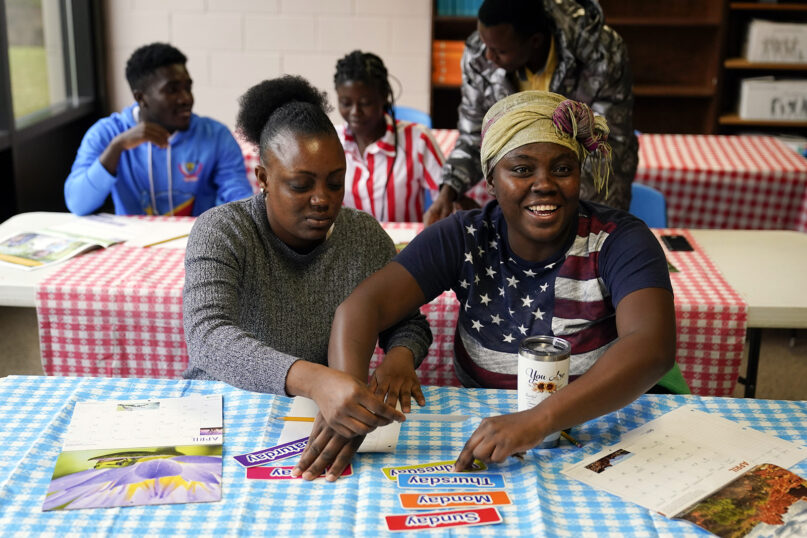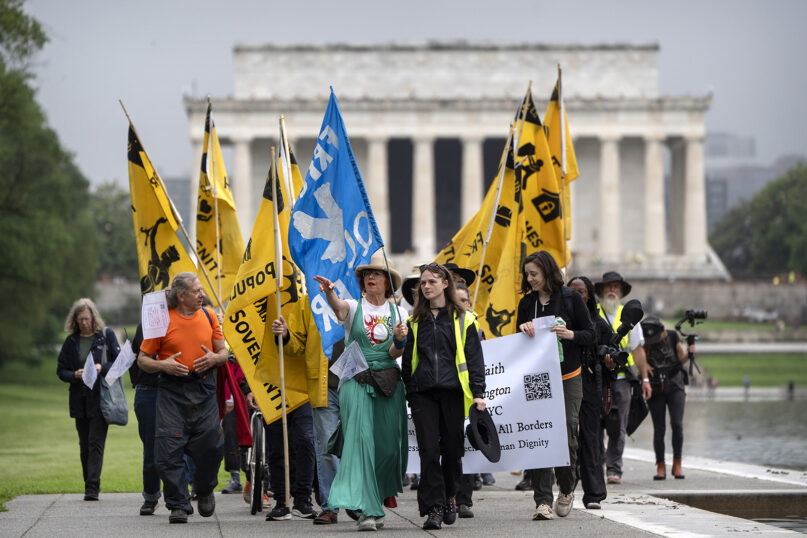(RNS) — On World Refugee Day (June 20), we will be called to be conscious of the estimated 139 million people who are expected to be displaced in 2025. Last year, more than 122 million people around the world were displaced from their homes by war, disaster and persecution.
According to the United Nations Refugee Agency, a staggering 40% of those displaced — some 50 million — are children. Shuttering U.S. foreign aid will only add to their numbers.
But as more people are forced from their homes than at any previous time, the Trump administration has shortsightedly closed the door to freedom for millions.
The administration has paused all funding for recent refugees already resettling in the U.S., including the 45-year-old U.S. Refugee Admission Program. Congress has stood aside, despite its duty to invest in these critical programs and ensure their good-faith operation by the executive branch.
In addition, more than 10,000 refugees who have already been screened and approved to resettle in the U.S. are now in limbo.
No one becomes a refugee or asylum-seeker by choice. Refugees who have been forced to flee their homes often wait in camps for years before their applications to enter a new country are approved. In the meantime, they often become lost, their lives in turmoil. The asylum process, meanwhile, requires people to enter or appear in the new country before they can apply for protection.

Leliz Bonilla Castro, left, and her sister Xochina Michelle Castro, refugees from Honduras, participate in an English class for refugees, April 11, 2024, in Columbia, S.C. (AP Photo/Erik Verduzco)
Historically, the United States has welcomed, with limits, refugees and asylees seeking a safer life. In turn, newcomers have helped make America great. In large and small cities, federal and state programs have organized processes for refugee resettlement, often working with eager local faith and community groups.
As they settle into a new home, learn a new language, navigate a new culture and get back on their feet, they enrich our communities with their culture and skills.
When I was growing up in rural Ohio, our community welcomed a Vietnamese family who had fled the war in Southeast Asia. Our church sponsored the newcomers under the refugee resettlement program at the time, and my parents volunteered to act as their host. A family of seven, including five children near the same ages as my siblings and I, became our neighbors. They eventually became responsible, taxpaying U.S. citizens and lifelong friends of ours.
Even after they had built a new life and we all moved to different homes, they brought us homemade egg rolls every year at Christmas and insisted on thanking us beyond our due. One of the children is now my father’s dentist and volunteers her dental services at a local prison.
I am forever grateful for discovering the world beyond my own borders through their openness with us and that early international family friendship. It’s only now, as an adult, that I understand the turmoil their family lived through to reach our small town in Ohio, though I can never fully grasp it, and the depth of gratitude they still feel for the new home they have made in our country.
The parents have passed on, and now their children and grandchildren call this country home. They are woven into the fabric of the community.

Quakers and their supporters walk along the Lincoln Memorial Reflecting Pool, May 22, 2025, in Washington, on the final day of a march of more than 300 miles from New York City to Washington, D.C., to demonstrate against the Trump administration’s crackdown on immigrants. (AP Photo/Mark Schiefelbein)
My own faith community, the Religious Society of Friends, also known as Quakers, fled persecution in England for our religious beliefs and still advocate fervently for freedom of belief as a core principle in the founding of the United States. From abolitionist and suffrage work to civil rights leadership, to peace advocacy, Friends have played an indelible role in U.S. history because previous generations were able to find refuge on this land.
Our belief that the divine lives within every person continues to inspire a commitment to freedom and human rights for all people, no matter their country of origin or how they arrived in our country.
I was renewed by this Spirit-led activism of Friends in May, as Quakers walked 300 miles from New York City to Washington in solidarity with immigrants and universal freedoms. In D.C., they met with legislators across the political spectrum, stressing that loving the stranger is a universal, revered and protected religious expression across faith traditions.
For many people of faith, providing sanctuary and refuge to those in need is a sacred act and a religious requirement.
As a Quaker, I am called to treat every person as equal, no matter their background or the journey they traveled to arrive here. U.S. and international law also recognize the same fundamental human rights for people fleeing persecution.
This year, as we mark the 45th anniversary of the United States Refugee Act of 1980, and on this World Refugee Day, Congress should stand up for freedom and human dignity, and for making America great again. A first step is committing to robust funding for refugee programs and working with the administration to reinstate the U.S. Refugee Admission Program.
(Bridget Moix is the general secretary of the Friends Committee on National Legislation and leads two other Quaker organizations, Friends Place on Capitol Hill and the FCNL Education Fund. The views expressed in this commentary do not necessarily reflect those of Religion News Service.)



